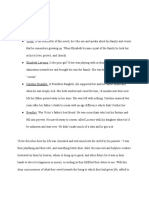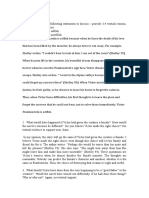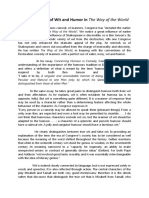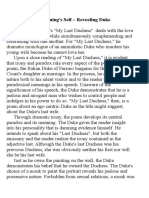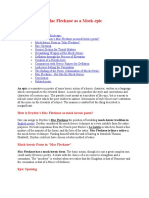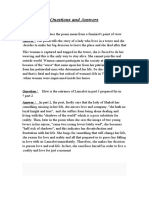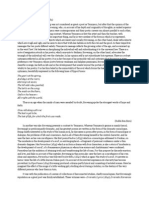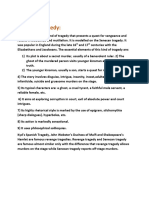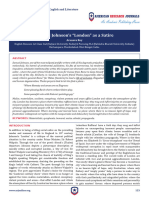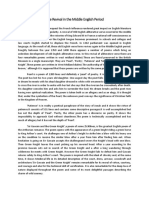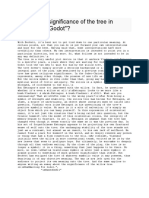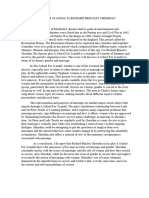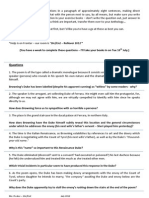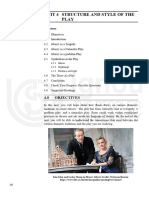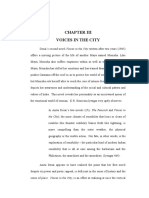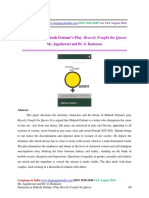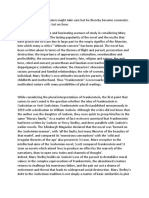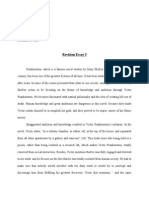Title: The Significance of The Title "Frankenstein" by Shelley
Title: The Significance of The Title "Frankenstein" by Shelley
Uploaded by
palsneha3280 ratings0% found this document useful (0 votes)
214 views3 pagesFrankenstein
Original Title
Titel
Copyright
© © All Rights Reserved
Available Formats
DOCX, PDF, TXT or read online from Scribd
Share this document
Did you find this document useful?
Is this content inappropriate?
Report this DocumentFrankenstein
Copyright:
© All Rights Reserved
Available Formats
Download as DOCX, PDF, TXT or read online from Scribd
Download as docx, pdf, or txt
0 ratings0% found this document useful (0 votes)
214 views3 pagesTitle: The Significance of The Title "Frankenstein" by Shelley
Title: The Significance of The Title "Frankenstein" by Shelley
Uploaded by
palsneha328Frankenstein
Copyright:
© All Rights Reserved
Available Formats
Download as DOCX, PDF, TXT or read online from Scribd
Download as docx, pdf, or txt
You are on page 1of 3
Title: The Significance of the Title
"Frankenstein" by Shelley
Mary Shelley's novel "Frankenstein" has become an iconic piece of literature
since its publication in 1818. The title itself holds significant meaning and
captures the essence of the novel's themes and motifs. By examining the origins
of the name, the character of Victor Frankenstein, and the broader implications
of the title, we can gain a deeper understanding of Shelley's intentions and the
enduring relevance of her work.
The title "Frankenstein or The Modern Prometheus" refers to the character of
Victor Frankenstein, the ambitious scientist who creates the creature that
becomes the central focus of the novel. However, it is important to note that
Frankenstein is not the name of the monster but of its creator. The name
Frankenstein has its roots in German folklore and is associated with a legendary
alchemist who sought to create life from dead matter. By invoking this name,
Shelley taps into a tradition of stories and legends surrounding the pursuit of
forbidden knowledge and the consequences of playing God. The subtitle, 'The
Modern Prometheus' brings to mind the Greek god Prometheus who gave the
knowledge of fire to humanity and was then severely punished for it. Victor,
attempting to become a modern Prometheus is certainly punished, but unlike
fire, his "gift" to humanity is the knowledge of the secret of life, which remains
an unraveled.
The character of Victor Frankenstein embodies the dual nature of the title's
significance. On one hand, he represents the creator, the one who aspires to
unlock the secrets of life and achieve God-like power. Victor's ambition and
obsession drive him to cross ethical boundaries, ultimately leading to the
creation of the monster. His arrogance and neglect of his creation demonstrate
the dangers of unchecked scientific pursuit, highlighting the perils of playing
with the forces of life and death. On the other hand, Victor himself becomes a
kind of monster as his actions and guilt consume him. He is tormented by the
consequences of his creation, haunted by the "wretch" he brought to life. This
duality of Frankenstein's character reflects Shelley's exploration of the blurred
lines between creator and creation, suggesting that the true monster may reside
within the creator's own heart and mind. Rather than offering the Monster
"the small portion of happiness which was yet in my power to bestow" –he
performs the ultimate gesture of castration by destroying of the female
monster negating any hope that the Monster might gain access to a "chain
of existence and events". Consequently, the Monster strikes at Frankenstein
through elements in Frankenstein's own 'chain of existence and events':
after William and Justine Moritz, his bosom friend Henry Clerval and his
bride, Elizabeth. Victor's wedding night ends in a necrophiliac embrace. As
a parent, it was Victor’s duty to care for the child and nurture it in spite of
all odds. What makes a monster out of the creature is not its devilish
appearance, but its deep sense of isolation caused by parental
incompetence.
Frankenstein curses the day of its creation, and reiterates: "Begone! Relieve me
from the sight of your detested form". Given the fact that Victor Frankenstein
was already aware of the abhorrence of his unnatural gestation, he could have
taken the situation back in control by aborting the very idea of giving life to ‘the
thing’ that ‘lay at his feet’. Rejection of the child to an alien world solely
because of its ugliness is not justified at all because our notion of beauty is
socially conditioned. In case of the ‘creature’, this was far more expected as his
ugliness was something that initially appeared beautiful to Victor as he had
actually ‘chosen his parts’. All the misery that the creature faces then onwards
has its genesis in the initial rejection by the parent. So, Victor is the only parent
who is responsible for the ‘uncanny’ birth of his child and for all the hatred that
it faces throughout its life. Beyond the individual character of Victor
Frankenstein, the title "Frankenstein" carries broader implications that resonate
throughout the novel. The story raises profound questions about the nature of
responsibility, the limits of human knowledge, and the consequences of
tampering with the natural order.
Shelley uses the character of Victor and his creation to examine the ethical
implications of scientific progress and the dangers of unchecked ambition.
Through the lens of Frankenstein's pursuit of knowledge and the subsequent
destruction caused by his creation, the novel critiques the arrogance of humanity
and warns against the unbridled pursuit of power and control. Moreover, the
title "Frankenstein" has also come to represent the misunderstood and
marginalized "monster" in popular culture. The creature, despite being a product
of Victor's ambition, evokes sympathy as he grapples with his own identity and
the rejection he faces from society. In this sense, the title invites us to question
the nature of monstrosity and explore the themes of alienation and empathy. It
encompasses the multi-layered themes of ambition, responsibility, and the
consequences of playing God that are central to Shelley's novel. By referencing
the name, Shelley sets the stage for a thought-provoking exploration of
humanity's relationship with science, morality, and the boundaries of creation.
The enduring significance of the title "Frankenstein" lies in its ability to
captivate readers and provoke critical reflection on these timeless themes.
You might also like
- Frankenstein Final TestDocument4 pagesFrankenstein Final TestMary Nell StringerNoch keine Bewertungen
- Frankenstein AnnotationsDocument30 pagesFrankenstein Annotationsapi-612131991Noch keine Bewertungen
- Attempt A Comparison Between The Epithalamion and The Prothalamion As Wedding Songs. - My Exam Solution PDFDocument1 pageAttempt A Comparison Between The Epithalamion and The Prothalamion As Wedding Songs. - My Exam Solution PDFBir SinghNoch keine Bewertungen
- Seminar QuestionsDocument6 pagesSeminar QuestionsHaoxuan LiuNoch keine Bewertungen
- Analysis of FrankensteinDocument7 pagesAnalysis of FrankensteinbracketsNoch keine Bewertungen
- Comparing Victor Frankenstein and The Monster in Mary Shelley's FrankensteinDocument1 pageComparing Victor Frankenstein and The Monster in Mary Shelley's FrankensteinThesa TagalogNoch keine Bewertungen
- A Critical Comment On Samuel Johnsons Lo PDFDocument4 pagesA Critical Comment On Samuel Johnsons Lo PDFBanasre BiswasNoch keine Bewertungen
- Compare/Contrast Dr. Frankenstein and "The Monster"Document3 pagesCompare/Contrast Dr. Frankenstein and "The Monster"Faruk R AhamedNoch keine Bewertungen
- Congreve's Use of Wit and Humour. SH CDocument3 pagesCongreve's Use of Wit and Humour. SH CShahnawaz Hussain100% (1)
- Faerie Queen NotesDocument8 pagesFaerie Queen NotesMohsin MirzaNoch keine Bewertungen
- Elegy Written in A Country ChurchyardDocument2 pagesElegy Written in A Country ChurchyardSathish KumarNoch keine Bewertungen
- "Dover Beach" Is Poem of Melancholy and Sadness.-DiscussDocument6 pages"Dover Beach" Is Poem of Melancholy and Sadness.-DiscussMuhammad HashimNoch keine Bewertungen
- Representations of Women in The Mayor of Casterbridge and Our Mutual FriendDocument3 pagesRepresentations of Women in The Mayor of Casterbridge and Our Mutual FriendManoj SanfuiNoch keine Bewertungen
- Browning's Self - Revealing DukeDocument3 pagesBrowning's Self - Revealing DukeYahia Al-NaggarNoch keine Bewertungen
- Critical Appreciation of To His Coy Mistress' - Andrew MarvellDocument3 pagesCritical Appreciation of To His Coy Mistress' - Andrew MarvellSubham SahuNoch keine Bewertungen
- Carnival SettingDocument2 pagesCarnival Settingneha rahmanNoch keine Bewertungen
- 102-1mac Flecknoe As A MockDocument8 pages102-1mac Flecknoe As A Mockworld UNONoch keine Bewertungen
- Fleknoe Guide Inuendo and AllusionsDocument16 pagesFleknoe Guide Inuendo and AllusionsManu JamesNoch keine Bewertungen
- Forster, E. M. - A Passage To IndiaDocument8 pagesForster, E. M. - A Passage To IndiaAida Obarcanin MurticNoch keine Bewertungen
- Trickery, Marriage and Femininity in The Rover 1Document8 pagesTrickery, Marriage and Femininity in The Rover 1Akshay Bhardwaj100% (1)
- Ojsijellh, 30-The Political and Philosophical Themes (1) .Docx Final-1Document7 pagesOjsijellh, 30-The Political and Philosophical Themes (1) .Docx Final-1Devolina DasNoch keine Bewertungen
- Questions and AnswersDocument2 pagesQuestions and Answersمحمد ناصر عليويNoch keine Bewertungen
- Theme of Pathos - Elegy Written in A Country ChurchyardDocument4 pagesTheme of Pathos - Elegy Written in A Country ChurchyardRaktim BanerjeeNoch keine Bewertungen
- " An Elegy Written in A Country Churchyard ": Leaves The World To Darkness and To MeDocument26 pages" An Elegy Written in A Country Churchyard ": Leaves The World To Darkness and To MeattiqaNoch keine Bewertungen
- School For ScandlesDocument28 pagesSchool For ScandlesAbdul HaseebNoch keine Bewertungen
- Critical AppreciationDocument13 pagesCritical Appreciationawaiskhanji545Noch keine Bewertungen
- Escapism in Romantic Poetry and Conventional PoetryDocument8 pagesEscapism in Romantic Poetry and Conventional PoetryHania Eng21Noch keine Bewertungen
- LiteratureDocument2 pagesLiteratureAnamika Rai PandeyNoch keine Bewertungen
- Revenge TragedyDocument1 pageRevenge TragedyRaihan AliNoch keine Bewertungen
- Character Sketches - A Tale of 2 CitiesDocument4 pagesCharacter Sketches - A Tale of 2 CitiesHaleema GulNoch keine Bewertungen
- Samuel Johnson's "London" As A SatireDocument3 pagesSamuel Johnson's "London" As A SatirerockbuzzprakashNoch keine Bewertungen
- Alliterative Revival in The Middle English PeriodDocument2 pagesAlliterative Revival in The Middle English PeriodSubhankar Acharjya100% (1)
- What Is The Significance of The Tree in WFGDocument2 pagesWhat Is The Significance of The Tree in WFGDaffodilNoch keine Bewertungen
- The Vicar of Wakefield Summary-1Document6 pagesThe Vicar of Wakefield Summary-1Urvi VaghelaNoch keine Bewertungen
- A SCHOOL FOR SCANDAL by RICHARD BRINSLEY SHERIDANDocument1 pageA SCHOOL FOR SCANDAL by RICHARD BRINSLEY SHERIDANAyça GöçerNoch keine Bewertungen
- Faerie Queene Blog 28pDocument28 pagesFaerie Queene Blog 28pEbrahim MahomedNoch keine Bewertungen
- ThemesDocument3 pagesThemesbozNoch keine Bewertungen
- The Contribution of Charles Lamb As An Essayist To The English LiteratureDocument5 pagesThe Contribution of Charles Lamb As An Essayist To The English LiteratureHimanshuNoch keine Bewertungen
- The Way of The World William CongreveDocument10 pagesThe Way of The World William CongreveSebika TiggaNoch keine Bewertungen
- 10c/en2 - My Last Duchess QuestionsDocument2 pages10c/en2 - My Last Duchess Questionsjfoster100% (1)
- 96-Fiction II - Summary - The Vicar of WakefieldDocument3 pages96-Fiction II - Summary - The Vicar of WakefieldIshitaNoch keine Bewertungen
- Gothic Elements and A Psychological Reading of The Novel "The Strange Case of DR - Jekyll and MR - Hyde"Document12 pagesGothic Elements and A Psychological Reading of The Novel "The Strange Case of DR - Jekyll and MR - Hyde"kiki shadapNoch keine Bewertungen
- The Scholar-Gipsy: English Literature Semester-IiDocument4 pagesThe Scholar-Gipsy: English Literature Semester-IiubaidNoch keine Bewertungen
- Elegy Written in A Country Courtyard - Thomas Gray: PointsDocument25 pagesElegy Written in A Country Courtyard - Thomas Gray: PointsNishita SankhalaNoch keine Bewertungen
- Return of The Native As A Victorian NovelDocument2 pagesReturn of The Native As A Victorian Novelshamsherwalikhan khanNoch keine Bewertungen
- MOST IMPORTANT SHORT QUESTIONS The Prelude, Odes by Keats, YeatsDocument3 pagesMOST IMPORTANT SHORT QUESTIONS The Prelude, Odes by Keats, YeatsDDC RYKNoch keine Bewertungen
- Volpone - Wikipedia PDFDocument28 pagesVolpone - Wikipedia PDFRIYAS AHAMEDNoch keine Bewertungen
- Sir Gawain and The Green Knight Is A Medieval RomanceDocument1 pageSir Gawain and The Green Knight Is A Medieval RomanceMary Cris EspirituNoch keine Bewertungen
- Critical Analysis of Jimmy PorterDocument2 pagesCritical Analysis of Jimmy PorterMian Hamayun NawazNoch keine Bewertungen
- My Reminiscences by Tagore, Rabindranath, 1861-1941Document109 pagesMy Reminiscences by Tagore, Rabindranath, 1861-1941Gutenberg.org100% (1)
- GhostsnotesDocument15 pagesGhostsnotesBidisha DuttaNoch keine Bewertungen
- 08 - Chapter 3 PDFDocument48 pages08 - Chapter 3 PDFVarsha tiriyaNoch keine Bewertungen
- Houses), Osborne's Handling of Social Themes Is Decidedly Haphazard. For Osborne SocialDocument3 pagesHouses), Osborne's Handling of Social Themes Is Decidedly Haphazard. For Osborne SocialAnca Saraolu IonascutiNoch keine Bewertungen
- Shakespeare Sonnet 1Document3 pagesShakespeare Sonnet 1Samuel KuyeNoch keine Bewertungen
- ShelleyDocument13 pagesShelleyAmela HrasnicaNoch keine Bewertungen
- Critical GulliversDocument3 pagesCritical Gulliversfarah zaheer100% (1)
- MANSFIELD PARK WOMEN'S EDUCATION - PDF 4Document86 pagesMANSFIELD PARK WOMEN'S EDUCATION - PDF 4Sharmila DasNoch keine Bewertungen
- Use of Art and Painting in Andrea and LippoDocument6 pagesUse of Art and Painting in Andrea and LippoBipasha SenNoch keine Bewertungen
- Feminism in Mahesh Dattani's Play Bravely Fought The QueenDocument12 pagesFeminism in Mahesh Dattani's Play Bravely Fought The QueenFaruk R AhamedNoch keine Bewertungen
- Locating Cultures in North East PoetryDocument14 pagesLocating Cultures in North East PoetryKaushik Ray100% (1)
- John Holloway Odes of KeatsDocument7 pagesJohn Holloway Odes of Keatspalsneha328Noch keine Bewertungen
- Corrected Version (Autumn) KeatsDocument7 pagesCorrected Version (Autumn) Keatspalsneha328Noch keine Bewertungen
- Kubla KhanDocument5 pagesKubla Khanpalsneha328Noch keine Bewertungen
- Dream ChildrenDocument7 pagesDream Childrenpalsneha328Noch keine Bewertungen
- QA FrankensteinDocument14 pagesQA Frankensteinpalsneha328Noch keine Bewertungen
- Narratives of Resistance Mahasweta Devi 231116 185611Document14 pagesNarratives of Resistance Mahasweta Devi 231116 185611palsneha328Noch keine Bewertungen
- John Keats Attitudes Towards DeathDocument8 pagesJohn Keats Attitudes Towards Deathpalsneha328Noch keine Bewertungen
- SUMMARY of ElegyDocument5 pagesSUMMARY of Elegypalsneha328Noch keine Bewertungen
- Interaction Between Mirabell & MillamantDocument7 pagesInteraction Between Mirabell & Millamantpalsneha328Noch keine Bewertungen
- Sir Roger at HomeDocument9 pagesSir Roger at Homepalsneha328Noch keine Bewertungen
- Robinson As A Colonial TextDocument2 pagesRobinson As A Colonial Textpalsneha328Noch keine Bewertungen
- Elegy Written in A Country ChurchyardDocument5 pagesElegy Written in A Country Churchyardpalsneha328Noch keine Bewertungen
- Essay On ArnoldDocument4 pagesEssay On Arnoldpalsneha328Noch keine Bewertungen
- Psychoanalysis and FrankensteinDocument10 pagesPsychoanalysis and FrankensteinHenessa Gumiran100% (1)
- Frankenstein Bioethics EssayDocument4 pagesFrankenstein Bioethics Essayapi-737226122Noch keine Bewertungen
- Frankenstein PaperDocument5 pagesFrankenstein Paperapi-537768194Noch keine Bewertungen
- Frankenstein - Explore The Relationship Between Creator and Creation (Victor & Monster, God and Adam)Document3 pagesFrankenstein - Explore The Relationship Between Creator and Creation (Victor & Monster, God and Adam)Veljko SpasicNoch keine Bewertungen
- Human Monster and Moster HumanDocument5 pagesHuman Monster and Moster HumanKaushik RayNoch keine Bewertungen
- Shelley FrankensteinDocument5 pagesShelley Frankensteinrnguyen12Noch keine Bewertungen
- The Paratext of Frankenstein's Title Page How It Contributes To Our Understanding of The Novel and Its Contemporary ReceptionDocument8 pagesThe Paratext of Frankenstein's Title Page How It Contributes To Our Understanding of The Novel and Its Contemporary ReceptionTeeNoch keine Bewertungen
- Dorian Grey EssayDocument3 pagesDorian Grey Essayapi-285282010Noch keine Bewertungen
- Book Presentation: by Ernestas Bogdan IADocument11 pagesBook Presentation: by Ernestas Bogdan IAKimaNoch keine Bewertungen
- Morton - Frankenstein and Ecocriticism PDFDocument15 pagesMorton - Frankenstein and Ecocriticism PDFLuis GarcíaNoch keine Bewertungen
- The Omnipotent NatureDocument6 pagesThe Omnipotent NatureNavin Gamage100% (2)
- Frankenstein Notes - ImportantDocument11 pagesFrankenstein Notes - ImportantAlba LourençoNoch keine Bewertungen
- Themes and Motifs in FrankensteinDocument3 pagesThemes and Motifs in FrankensteinMarie Stoie100% (2)
- ParasiteDocument6 pagesParasiteapi-284573559Noch keine Bewertungen
- Frankenstein AnalysisDocument4 pagesFrankenstein AnalysisAhmad ShadiqiNoch keine Bewertungen
- Representation of Class in Mary W. Shelley's FrankensteinDocument7 pagesRepresentation of Class in Mary W. Shelley's FrankensteinMeishe Anisa VinaNoch keine Bewertungen
- He Who Fights With Monsters Might Take Care Lest He Thereby Become A MonsterDocument5 pagesHe Who Fights With Monsters Might Take Care Lest He Thereby Become A MonsterKingshuk Mondal50% (2)
- Impact of COVID-19 On BusinessDocument8 pagesImpact of COVID-19 On BusinessHasan RabbiNoch keine Bewertungen
- Frankenstein S Character ComparisonDocument2 pagesFrankenstein S Character ComparisonBrígida WiccaNoch keine Bewertungen
- Imperialism in FrankensteinDocument3 pagesImperialism in FrankensteinArunava MisraNoch keine Bewertungen
- Frankenstein Study GuideDocument5 pagesFrankenstein Study GuidebrahbbrahNoch keine Bewertungen
- Frankenstein Character ChartDocument1 pageFrankenstein Character ChartBen NguyenNoch keine Bewertungen
- Revision Essay 3Document3 pagesRevision Essay 3api-302254756Noch keine Bewertungen
- Love ReportDocument24 pagesLove ReportZarahJoyceSegoviaNoch keine Bewertungen
- Superintelligence and Mental Anxiety From Mary Shelley To Ted ChiangDocument22 pagesSuperintelligence and Mental Anxiety From Mary Shelley To Ted Chianggisela ramos calderonNoch keine Bewertungen

